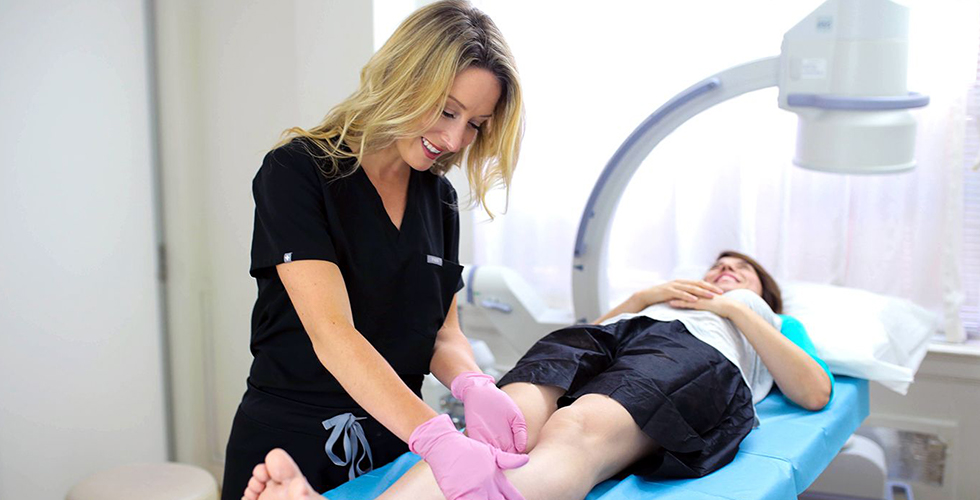How serious is varicose vein surgery?
Varicose vein surgery is a fairly serious procedure that should only be undertaken in the most extreme cases. In the past, about two decades ago, the only way to treat varicose veins and vein disease was through complex surgical procedures, such as vein ligation, vein stripping, and venous bypass surgery. Varicose vein surgeries involve multiple excisions, hospitalization, general anesthesia, and extended downtime. Furthermore, varicose vein surgeries also have a fairly high risk of infections and deep vein thrombosis.

In the past, since there were no other alternatives, individuals with varicose veins and vein disease had to undergo vein surgery. But that’s no longer the case. Thanks to recent advancements in vein care and technologies, patients with varicose veins can pursue numerous minimally invasive varicose vein treatments, such as endovenous laser ablation, endovenous radiofrequency ablation, venaseal, and ambulatory phlebectomy. Minimally invasive procedures are safer, more effective, and more convenient than varicose vein surgery.

As such, these days, varicose vein surgery should only be considered after all minimally invasive vein treatments have been exhausted. And even then, varicose vein surgery should only be reserved for extreme cases when patients have deep vein thrombosis, extremely large varicose veins, or other major complications. If your vein doctor recommends varicose vein surgery as the first treatment, you should definitely get a second (or third, fourth, or tenth) opinion from reliable, board-certified vein doctors.
Vein Treatment Clinic is a group of state-of-the-art vein clinics and vein centers led by board-certified vein doctors. Our vein treatment clinics specialize in minimally invasive vein treatments, such as radiofrequency ablation, endovenous laser ablation, venaseal, ambulatory phlebectomy, and sclerotherapy. We only provide minimally invasive vein treatments instead of vascular surgeries, ensuring your treatments are safe, convenient, and reliable. Our considered approach to vein care ensures optimal results without complications or vein disease recurrence.
Vein Treatment Clinic has state-of-the-art vein clinics across the United States, including New York City, Long Island, New Jersey, California, and Maryland (Washington DC). Please schedule an appointment to explore your minimally invasive vein treatment options at our vein centers.
How long does it take to recover from varicose vein surgery?
Varicose vein surgery is a complex surgical procedure that involves multiple excisions, grafts, and other techniques. Since it involves significant manipulation of your skin and internal tissues, the recovery period is also considerably high. Most patients need 1 to 4 weeks of downtime after traditional varicose vein surgeries to recover completely. During the recovery period, patients must avoid exercises, lifting heavy objects, and other such activities.
Compared to varicose vein surgeries, minimally invasive vein treatments don’t involve any downtime. You can resume your daily activities and work immediately after your vein treatment. You have to wear compression stockings for a few weeks, but most patients don’t see that as a problem. You will also have to avoid strenuous workouts and heavy lifting for a week, following which you can resume regular activities.
What are the best minimally invasive alternatives to varicose vein surgery?
The best minimally invasive alternatives to varicose vein surgery are radiofrequency ablation, endovenous laser ablation, and venaseal. Endovenous radiofrequency and laser ablation involve channeling thermal or laser energy into the diseased saphenous vein to destroy its vein walls, thus rerouting the accumulated blood into healthier leg veins. VenaSeal involves injecting a medical-grade adhesive into the diseased vein to seal its walls, turning it into a hardened tissue eventually absorbed by the body. The accumulated blood soon reroutes into healthier leg veins.
Endovenous ablation and venaseal treat the root cause of varicose veins — chronic venous insufficiency. If you also want to remove all the superficial varicose veins, your vein doctor may recommend an ambulatory phlebectomy. During ambulatory phlebectomy, also known as microsurgery, the vein doctor makes small incisions on the skin’s surface to physically extract the unwanted varicose veins. Once the varicose veins are removed, the incision marks gradually heal and fade away. This procedure offers immediate results.
Are minimally invasive varicose vein treatments effective in the long run?
Minimally invasive vein treatments are certainly effective in the long run, especially if your vein doctor diagnoses and treats the root cause of varicose veins. Your vein doctors must use endovenous ablation or venaseal to collapse the diseased saphenous vein responsible for your vein problems, following which the varicose veins can be removed. If your vein doctor removes varicose veins without addressing the root cause, there would be a higher risk of recurrence.
Compared to varicose vein surgery, minimally invasive vein treatments ensure a lower risk of vein disease recurrence. Studies have shown that patients undergoing varicose vein surgery have a higher risk of infections, deep vein thrombosis, and vein disease recurrence. Meanwhile, endovenous laser ablation, venaseal, and other minimally invasive procedures carry a negligible risk of complications and vein disease recurrence.
Can you walk after minimally invasive vein treatments?
You can walk immediately after minimally invasive vein treatments. In fact, you will be asked to walk frequently after your varicose vein treatment to promote optimal blood circulation and prevent the accumulation of blood in your leg veins.
Can wearing compression stockings make varicose veins go away?
Wearing compression stockings will prevent varicose veins from worsening, but it won’t treat the root cause of your vein problems. Once your vein valves are damaged, there’s no way to heal them. The only way to treat vein disease and varicose veins is to remove the diseased vein, thus allowing blood to reroute into healthier leg veins. Compression stockings can offer temporary relief, but they aren’t alternatives to minimally invasive vein treatments. For more information, please talk with your doctor about your vein treatment options.








